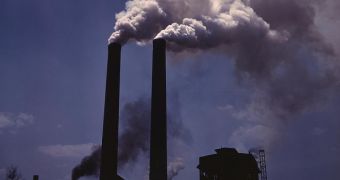Past studies argued that the maximum amount of carbon that our atmosphere could handle was somewhere around 450 ppm (parts per million). However, this is an extremely wrong assessment, argue the supporters of a new theory, which states that a maximum of 350 ppm is sufficient to trigger significant changes in our planet's life-sustaining equilibrium.
An international research team, featuring scientists from the United States, the United Kingdom and France, have found that atmospheric CO2 is already at 385 ppm, and constantly rising by about 2 ppm each year. The main culprit for this increase is the burning of fossil fuels to generate electricity. Coal, oil, and natural gases are responsible for the enormous amounts of carbon emitted into the air worldwide.
“This work and other recent publications suggest that we have reached CO2 levels that compromise the stability of the polar ice sheet. How fast ice sheets and sea level will respond are still poorly understood, but given the potential size of the disaster, I think it’s best not to learn this lesson firsthand,” warned Yale professor of geology and geophysics Mark Pagani, who is also one of the authors of the current study detailing the new theory.
A potential solution to this problem could be the complete phase-out of coal and oil by 2030, the authors say. This would lead to CO2 levels reaching a peak of 400-425 ppm, after which they would slowly begin to decline. However, it's highly unlikely for this to happen, especially considering that some countries are just now finding out about large reserves of fossil fuels on their territories.
“[By] following a path that leads to a lower CO2 amount, we can alleviate a number of problems that had begun to seem inevitable, such as increased storm intensities, expanded desertification, loss of coral reefs, and loss of mountain glaciers that supply fresh water to hundreds of millions of people,” said lead study author James Hansen, from the Columbia University.
The new finding raises many concerns about the future of our civilization, and to whether or not our atmosphere will be able to sustain life for much longer. Undoubtedly, critics of this new study will say that the results are wrong or faked. But the fact of the matter is that urgent action needs to be taken immediately, so as to prevent a global catastrophe.

 14 DAY TRIAL //
14 DAY TRIAL //